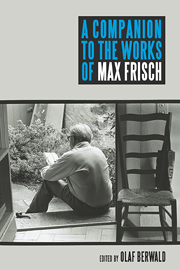Book contents
- Frontmatter
- Contents
- Acknowledgments
- Note on the Abbreviations
- Introduction: Max Frisch in the Twenty-First Century
- 1 Max Frisch's Early Plays
- 2 Spielraum in Max Frisch's Graf Öderland and Don Juan: Transparency as Mode of Performance
- 3 Max Frisch's Biedermann und die Brandstifter and Die große Wut des Philipp Hotz
- 4 Max Frisch's Andorra: Balancing Act between Pattern and Particular
- 5 Eternal Recurrence in Life and Death in Max Frisch's Late Plays
- 6 Max Frisch's Early Fiction
- 7 From Life to Literature: Max Frisch's Tagebücher
- 8 “Writing in order to be a stranger to oneself”: Max Frisch's Stiller
- 9 Cybernetic Flow, Analogy, and Probability in Max Frisch's Homo Faber
- 10 The Ends of Blindness in Max Frisch's Mein Name sei Gantenbein
- 11 Max Frisch's Montauk. Eine Erzählung
- 12 Man, Culture, and Nature in Max Frisch's Der Mensch erscheint im Holozän
- 13 “My life as a man. Everyman”: Max Frisch's Blaubart. Erzählung
- 14 Max Frisch's Essays and Speeches
- Frisch's Major Works
- Select Bibliography
- Notes on the Contributors
- Index
5 - Eternal Recurrence in Life and Death in Max Frisch's Late Plays
Published online by Cambridge University Press: 05 December 2013
- Frontmatter
- Contents
- Acknowledgments
- Note on the Abbreviations
- Introduction: Max Frisch in the Twenty-First Century
- 1 Max Frisch's Early Plays
- 2 Spielraum in Max Frisch's Graf Öderland and Don Juan: Transparency as Mode of Performance
- 3 Max Frisch's Biedermann und die Brandstifter and Die große Wut des Philipp Hotz
- 4 Max Frisch's Andorra: Balancing Act between Pattern and Particular
- 5 Eternal Recurrence in Life and Death in Max Frisch's Late Plays
- 6 Max Frisch's Early Fiction
- 7 From Life to Literature: Max Frisch's Tagebücher
- 8 “Writing in order to be a stranger to oneself”: Max Frisch's Stiller
- 9 Cybernetic Flow, Analogy, and Probability in Max Frisch's Homo Faber
- 10 The Ends of Blindness in Max Frisch's Mein Name sei Gantenbein
- 11 Max Frisch's Montauk. Eine Erzählung
- 12 Man, Culture, and Nature in Max Frisch's Der Mensch erscheint im Holozän
- 13 “My life as a man. Everyman”: Max Frisch's Blaubart. Erzählung
- 14 Max Frisch's Essays and Speeches
- Frisch's Major Works
- Select Bibliography
- Notes on the Contributors
- Index
Summary
This essay will examine Frisch's two last plays, Biografie: Ein Spiel (Biography: A Game, 1967) and Triptychon: Drei szenische Bilder (Triptych: Three Scenic Panels, 1978). Biografie was first performed on February 1, 1968 at the Schauspielhaus Zürich under the direction of Leopold Lindtberg. Triptychon was initially staged in French at the Centre dramatique de Lausanne on October 10, 1979 and was directed by Michel soutter. Its German premiere took place on February 1, 1981 at the Akademietheater Vienna. The director on this occasion was Erwin Axer. While these two dramatic works have been extensively analyzed by Frisch scholars, the common thematic, philosophical, and even structural elements binding them have been the object of only cursory attention. Although it has been recognized that they continued to develop the author's central paradigms of permutation and repetition, thus linking them to another late work, the novel Mein Name sei Gantenbein (1964, Let My Name Be Gantenbein, translated as A Wilderness of Mirrors, 1965), the two plays also strikingly invoke the principle of eternal recurrence in the realms of both life and death. While Biografie provides its chief protagonist the chance to alter the development of his life by changing key moments in his existence but constantly confronts this protagonist with dilemmas that cause him to repeat his life in almost all its particulars, the third “panel” of Triptychon shows a man apparently permitted to alter the last moments of his relationship to a deceased lover.
- Type
- Chapter
- Information
- A Companion to the Works of Max Frisch , pp. 72 - 90Publisher: Boydell & BrewerPrint publication year: 2013



